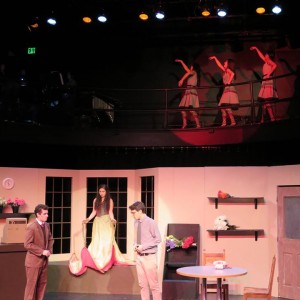It’s the beginning of a new semester, and I’m sure many students are asking themselves the same question I ask myself time and time again: How much can I realistically take on? Balancing academics and extracurricular activities is always delicate. And even though it feels particularly strained right now as I prepare to write my spring JP, I know how important it is to find time for what I love to do. The purpose of this post is not to provide some cure-all for your scheduling woes — because everyone works differently — but rather to talk about what has worked for me.

Most of my time outside of class is dedicated to theater. I have performed in many productions on campus and serve as the Princeton University Players’ Vice President. Beyond the immense joys I find in making theater, it has taught me how to effectively manage my time: an invaluable skill for big research projects. Since rehearsals often run late, I’ve had to learn to speed-read during 10-minute breaks and work productively during time off. Luckily, there is support in the struggle to get everything done. McGraw has resources to help us develop more effective time management strategies and to make our time more productive.
 I am currently acting in Sophocles’ Elektra, for which I have spent the last few weeks and the entirety of intersession cooped up in the Lewis Center. (Shameless plug: Performances February 5, 6, 11, 12, and 13!) Long Reading Period rehearsals were particularly difficult, as I had over 40 pages of research essays looming over me. It necessitated active planning to make my free hours productive: daily goals of getting through the relevant literature, developing outlines, and writing my papers. It also meant I had to communicate my limits: letting the stage manager know just how much time I would need to set aside for work and research so that we could create a reasonable rehearsal schedule. It sounds simple, but it requires a certain degree of self-awareness to know where to draw the line about what we can and cannot handle.
I am currently acting in Sophocles’ Elektra, for which I have spent the last few weeks and the entirety of intersession cooped up in the Lewis Center. (Shameless plug: Performances February 5, 6, 11, 12, and 13!) Long Reading Period rehearsals were particularly difficult, as I had over 40 pages of research essays looming over me. It necessitated active planning to make my free hours productive: daily goals of getting through the relevant literature, developing outlines, and writing my papers. It also meant I had to communicate my limits: letting the stage manager know just how much time I would need to set aside for work and research so that we could create a reasonable rehearsal schedule. It sounds simple, but it requires a certain degree of self-awareness to know where to draw the line about what we can and cannot handle.
Ultimately, Princeton is about more than pure academics. Finding what matters to you outside of class is important, too, and may actually inform your research in unexpected ways. And while finding the time to make it happen is a constant challenge, the bliss of doing something for personal fulfillment makes it all the more rewarding.
– Dylan Blau Edelstein, Humanities Correspondent

